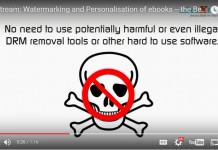I am saddened that David Rothman brought up, in public rather than in private, the “three musts” he raised in his recent blog article regarding my involvement in e-book standards work. David has not only been a long-time business associate, but a friend. It saddens me more because we are in philosophical agreement about most things in the digital publishing arena, and seek the same end goals. I am also troubled that others were needlessly brought into this matter, such as my friends at OSoft, and my friends and associates at DPP.
The valuable time that I am spending to write this article could instead be used to work on other things to help promote OpenReader, such as BookX. BookX is intended to be used by smaller digital publishers as an intermediary XML master to readily produce OpenReader Publications and most of the digital publication formats in use today and tomorrow (and this includes OEBPS.)
Importance of independence
Two days ago I posted a message to The eBook Community (TeBC), which I founded in 1996 and still administer, announcing my new association with DigitalPulp Publishing. I pledged that TeBC will remain free of influence from any commercial entity, including DPP. In the capacity of administering TeBC, I will continue to act as I always have. And DPP enthusiastically supports the full independence of TeBC. TeBC’s cutting-edge independence best benefits the industry, and a vibrant e-book industry is good for everyone’s business.
I know David Rothman agrees with the importance of independence since, like TeBC, the TeleRead blog has been truly independent of corporate influence. TeleRead has that needed “cutting edge” we don’t see with some other ebook-related blogs/forums, and as a result it is the success it is today.
E-book standards
Regarding e-book standards, DPP recognizes, as I do, the vital importance of truly open standards — standards which are not captive in any way to the whims or direction of one or a small number of high tech companies, some of whom might even try to use the façade of some “open” organization.
The OpenReader Format specification is a candidate, next-generation, open standards digital publication format, developed well before my recent association with DPP, and meets this requirement of true independence. OpenReader was developed not to benefit any one company, but rather to meet the real, long-term needs of publishers and users. It was designed to be free from any undue influence by particular corporate entities with short-term goals that seek de facto captive control of e-book standards for immediate gain without concern for the long-term good of the entire industry.
As such, OpenReader has been attacked by a few participants in the e-book standards debate because, to speak frankly, it stood in their way, and not because of any technical demerits. Notice that few of the critics have addressed, in an objective technical sense, any problems with the current OpenReader draft standard. (This doesn’t mean there are no problems with the current OpenReader Binder specification, which forms the core 90% of the format. No standard is ever perfect. We always welcome critical technical feedback.)
OpenReader’s independence is also completely supported by the people at DPP. DPP supports, and will always support, all possible e-book formats in their bookstores at the behest of publishers.
About my association with DPP
Regarding my association with DigitalPulp Publishing, I am thrilled and excited to be working with such a fine group of people: seasoned, long-time, successful entrepreneurs, who in the past have also been involved with hardware, software and standards-development in other industries. They have a passion and zeal for books and the digital publication industry. Philosophically we are in agreement on all the important core issues, otherwise I would not have enthusiastically agreed to join their venture when invited.
DPP intends to develop and deliver new and powerful solutions to benefit e-book readers and the digital publication industry as a whole. I am excited to be a part of this effort. Very soon DPP will release the first of hopefully many innovations (under another name and new web site) that I believe will greatly benefit e-book readers and the industry in general. Look for the forthcoming announcement. (To make it clear, this first innovation was developed without any help or advice from me since it was conceptualized and developed well before I joined DPP. Catherine Hodge at DPP has been working triple-overtime for the past few months getting this project finished and has done a remarkable job.)
OASIS and ISO
I remain dedicated to the development of truly independent open standards and hope to bring OpenReader into OASIS or similar standards group, with eventual ISO standardization a long-term goal. The founders of DPP, who are quite experienced with ISO standards work, have also agreed to support me without placing any requirements on me that would make that effort any less independent than it has been in the past.
Conclusion
Hopefully this article addresses some of the points David Rothman brought up. I regret the necessity of posting this article and hope that it resolves a few of the questions raised in David’s blog. I do not wish to continue a long blog discussion on this since, frankly, David Rothman should not have posted what he did in the first place. There are better ways for people, who are working together as a team for common goals, to resolve and work out their differences than to air them in public like this. I much prefer to use the time to continue my work on BookX 1.0, a valuable component to the OpenReader system, and to promote open standards and independence in the e-book community.

































Glad to See your reply, Jon… Here are my comments regarding David’s Recent Piece (also my latest blog entry at: http://dppebookstore.blogspot.com/)
Blog wars, flame wars, journalism, objectivity… personal laundry aired in public. Recently, our company, DigitalPulp Publishing was mentioned in the context of a personal dispute between Teleread Author, David Rothman and OpenReader co-founder, Jon Noring. David R. was bringing up his doubts about the ability of Mr. Noring to remain independent in the light of his new affiliation with DigitalPulp Publishing.
Ironic, that DigitalPulp Publishing was founded with the most independent of spirits… DPPstore, our eBook retailing site is exclusively for eBooks by independent authors and publishers. We are format agnostic, and hugely in favor of the development of a non-proprietary standard that will allow readers to buy eBooks with confidence knowing that their eBook will be readable regardless of their choice of reading platforms (software and hardware). David R. makes us sound like the evil empire… (I’m putting on my Darth-Vader gear now). I found myself reading this article, which expressed Rothman’s doubts of the personal integrity of Jon Noring, his ability to remain independent in light of working for and with DigitalPulp Publishing, thinking about the difference between speculative journalism, investigative journalism, and Op Ed pieces.
So many blogs are based on Op Ed… just one person blasting out their perceptions of the universe, in microscopic detail or vast sweeping statements. David R. has established Teleread with a backbone of journalistic tradition. He has focused on hardware, software, standards and other eBook issues. He has invited contributors with expertise in all of the realms of eBooks to participate in the dialogue whether or not he was in agreement with their point of view. That is why I, like many interested in eBooks, read Teleread.
I was disappointed with the tone and tenor of Rothman’s latest piece… (But admittedly, I was flattered by the notion that DPP was so powerful that anyone who joined our ranks would be swayed from all of their previously held values and beliefs). Seriously though, there is no need to air personal feelings as if they had any basis in objective facts. Also, David R. managed to muddle up the following issues:
On the first point, I agree completely with David. Corporate interests could be in conflict with standards development, IF:
DPP meets neither of these conditions. We are format agnostic in our store – we will sell eBooks in whatever format the publishers create and whatever format the consumers will buy. We are also not invested in any particular standard. We do believe that it is essential for the industry to have standards. David’s point in his article about how standards affect the consumer, “As an ordinary e-book user I badly want be able to own digital books for real and not be at the mercy of any particular company,” is a sentiment we share at DPP. We have not built a business that is dependent on the success of a particular format or an untested standard. Our business is to deliver content in the form that the consumers demand.
On the issue of Jon Noring’s honor – David Rothman has leaped overboard on this one…. Not only is Jon entirely capable of separating his vocation from his passionate avocation of standards development, it is shocking that someone so closely affiliated with him would publicly raise these kinds of doubts. In addition, as I stated previously, DigitalPulp Publishing is in favor of the emergence of a nonproprietary standard for eBook publications – leaving no moral conflict for Jon Noring to battle. In fact, standards are an essential component in realizing the full potential of the eBook market. Consumers must be able to buy an eBook reader, and know that when they download eBooks, they will be readable on their device. It’s common sense. I have seen many of the people in the eBook business engage in the folly of trying to bully consumers into a proprietary format through hardware ties or marketing schemes (such as getting a well known sales channel to exclusively sell eBooks utilizing your pet format). I believe that since there are an infinite number of solutions to the eBook puzzle, making a monopoly impossible to attain, focusing on proprietary formats only handicaps the growth of the industry. A unifying standard (which must be a non-proprietary one) will open up exponential expansion of eBook technology.
On the issue of OSoft’s timely implementation – David Rothman obviously has no idea what the process of software development entails. Timelines in software development are usually made of silly putty! The fact that OSoft has a working Beta at this date is impressive and a testament to their dedication and work ethic. OSoft’s dotReader is an open source project with SVN repositories viewable on OSoft’s Website through the Source Code Link. The development of dotReader is going to include facilitating the reading of all possible formats, including OpenReader’s own. Currently, the basic XML format (dotReader format) is just the quick and easy way to showcase the unique features of XML based formats (such as OpenReader) within the dotReader. They are NOT setting up a standard to compete with OpenReader; they have simply included a much less sophisticated XML format to get eBooks to XML quickly. We are all awaiting those creation tools that OpenReader is working on make it easier for all of us to create valid, nuanced XML-based eBooks.
The long and short – Jon Noring is a dedicated member of the standards community (a thankless job if you ask me) who is now also employed in his field of choice. OSoft’s dotReader is a well conceived and brilliantly implemented way to read eBooks (regardless of format). And DigitalPulp Publishing is a group of dedicated entrepreneurs who are grateful to count Jon Noring among our ranks, and who also fully support Mr. Noring’s continuing efforts in the standards community.
Hi, Jon and Catherine. Here’s my reply to the replies. Among other things, the DigitalPulp store’s existing home page is actually rather harmful to the cause of OpenReader—unwittingly, I’d hope—and I give the specifics while concluding with some solutions to get things on back track. Happy holidays. David